July 14, 2006
The streets of Safed in Northern Israel are now "eerily quiet," according to Rivky Kaplan, a 30-year-old Lubavitch emissary and mother of five, whose home was struck by a Katyusha rocket launched from southern Lebanon on Thursday afternoon. But for those who have remained behind, Chabad-Lubavitch has taken the initiative in providing food for the victims of the new terrorist offensive against Israel.
"Many people have left the city," said Kaplan.
Most of the city has been evacuated, and many of those who stayed behind are holed up in the city's sparse bomb shelters, after a Thursday night order by the Israeli Defense Force's Homefront Command to the more than two million residents of Israel's northern region – including Haifa, Acre, Nahariya and Kiryat Shmona – to stay in shelters in case of additional attacks.
According to Rabbi Zalman Duchman, director of development for Colel Chabad, Israel's flagship provider of humanitarian aid with branches throughout Israel, the group's soup kitchen in Safed, Aishel Binyamin, has quadrupled its daily output of meals from 250 to 1,000. While most of Safed's residents have taken up temporary residences elsewhere in the country, those most in need have remained behind because they have nowhere else to go.
"To eat inside the soup kitchen is extremely dangerous," Duchman said, "the police won't allow it. But people can come in and take meals with them. We have the only Meals on Wheels program in Safed. Just before Shabbat, we also went to all of our regulars – those without relatives and the poor – and hand delivered meals."
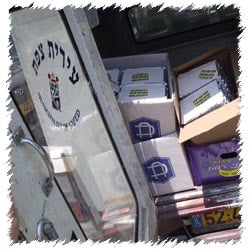
Duchman said that after Shabbat, Colel Chabad's warehouse in the southern town of Kiryat Malachi will dispatch more food to Safed to increase supply and start going from shelter to shelter to distribute care packages.
Hundreds of missiles have hit northern Israel since Thursday, killing four and injuring hundreds, following a Hizbullah ambush on an Israeli army patrol on Wednesday, killing eight soldiers and kidnapping two.
In response to the first of three onslaughts on Thursday, Rabbi Chaim Kaplan, Rivky Kaplan's husband and co-emissary to Safed, ordered the city's Tzeirei Ha'Shluchim yeshiva under his auspices evacuated to Kfar Sitrin, a small town south of Haifa. The yeshiva serves as a training program for children of Chabad-Lubavitch emissaries worldwide but is operating in scaled-down summer mode, with only eighty students aged 14-16 from across the globe.
When the rockets began to fall Thursday morning, everyone was shocked"When the rockets began to fall Thursday morning, everyone was shocked," said yeshiva administrator Menachem Traxler, a resident of Safed for the last five years, who was sitting in his office at the school when the first attack began. "I think everyone was shocked that such a thing could happen here."
During the morning attack one Katyusha rocket landed right in the heard of Shechunat Chabad, a Lubavitch-built housing project in Safed.
According to Traxler, the students – who hail from countries including Argentina, Australia, Canada, England, Italy, Russia, South Africa and the United States – were immediately gathered into the school's main auditorium to await private buses that picked them up and took them directly to Kfar Sitrin.
"The whole process took less than an hour," said Traxler. "Thank G‑d, all the boys are safe and happy."
During a midday assault on Thursday, a rocket struck the yeshiva in a direct hit, badly damaging the school library which doubles as a bomb shelter. The structure was empty following the students' evacuation a few hours earlier.
I heard a series of loud bangs... I gathered the kids... all the windows blew in... During the Thursday afternoon assault, another Katyusha rocket landed about five meters away from the Kaplans' home, with Mrs. Kaplan and all of her children inside.
"I heard a series of loud bangs, so I gathered the kids to run to the bomb shelter in our building. On my way there, all the windows blew in and the house started to fill with smoke," she said. "I only had a few seconds to decide what to do. The smoke was overpowering. So I grabbed the kids and ran outside instead."
The family took shelter at a house across the street until the smoke cleared, revealing the walls of their home pierced by shrapnel.
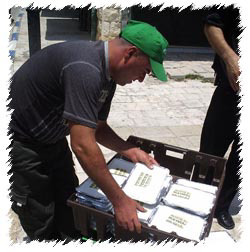
"It was a miracle that the rocket landed so close to the house, but didn't hit it directly," she said. "We were shaken up, but all of us walked away okay."
A few hours later Kaplan's husband miraculously escaped another Katyusha attack. En route home from the government office where he reported the damage to their home, a rocket landed about a meter away from the passenger side of his car, blowing out the car's windows and spraying his face and hands with shrapnel, while injuring his eye.
"I was in the middle of driving and suddenly I heard a very loud shrieking sound and then I saw the rocket fall," said Rabbi Kaplan. " There was a very strange explosion and I felt very weak. My car was totally destroyed, with gigantic holes on both sides. I was hurt from a lot of metal and glass shards, but I drove as much as I could.
“I stopped at the side of the road,” he continued, “and people helped me reach the hospital. It is a miracle that I survived.”
The rabbi was home before midnight.
Pausing to reflect on his own delivery from tragedy, Kaplan saw another act of Divine Providence in the timing of the rocket attacks. He pointed out that until Tuesday, Safed was teeming with tens of thousands of tourists who had gathered in the mystical city for a three-day klezmer music festival. The festival came to a close less than 40 hours before the first the first shell fell.
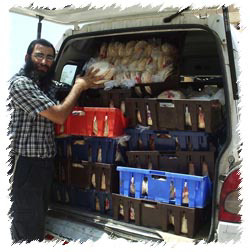
For the Sabbath the Kaplan family is joining the Tzeirei Ha'Shluchim yeshiva in Kfar Sitrin.
"We would have chosen to stay [in Safed], but the kids are too upset. It is very frightening because every time you hear a noise, you freak out and run into the bomb shelter," said Rivky Kaplan, who moved to Safed seven years ago from New Jersey. "It is scary. The battlefront has really come into our backyard and that is a very frightening feeling. I never expected that something like this to happen here."
What are the people of Safed making of the tragedy that has befallen them?
"I think it's clear," said Rivky Kaplan. "Giving into terror just breeds more terror. The Rebbe pleaded for years with Israel not to give away parcels of Israel. He said that giving away land would result in weakening Israel's security, emboldening the terrorists, and he was right."
Rabbi Kaplan added: "At this time of terror I think it's important also to recall the Rebbe's insistence during previous times of crisis, based upon Biblical assurances, that Israel is the safest place in the world, we should not leave Israel and, instead, work to strengthen our brethren here."

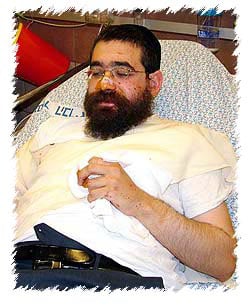
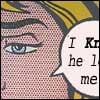


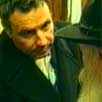

Join the Discussion